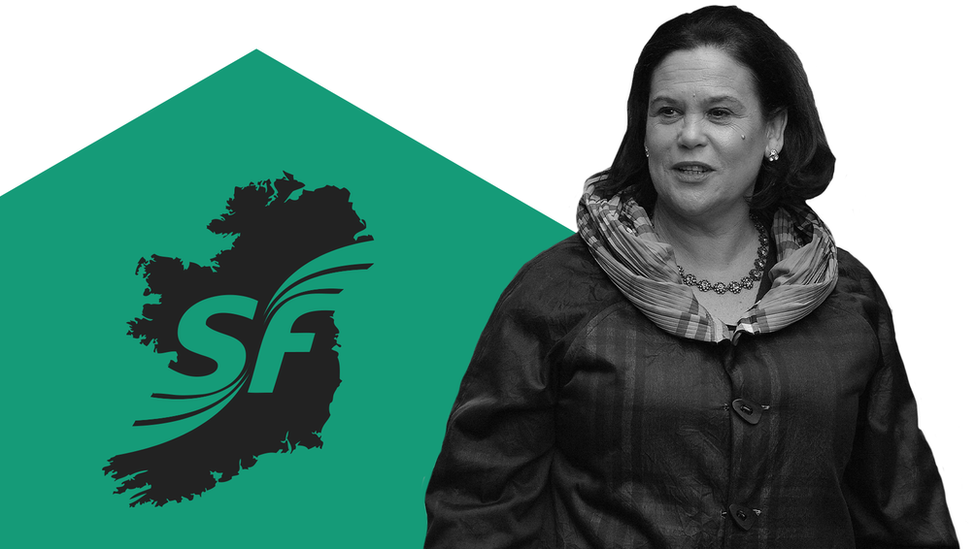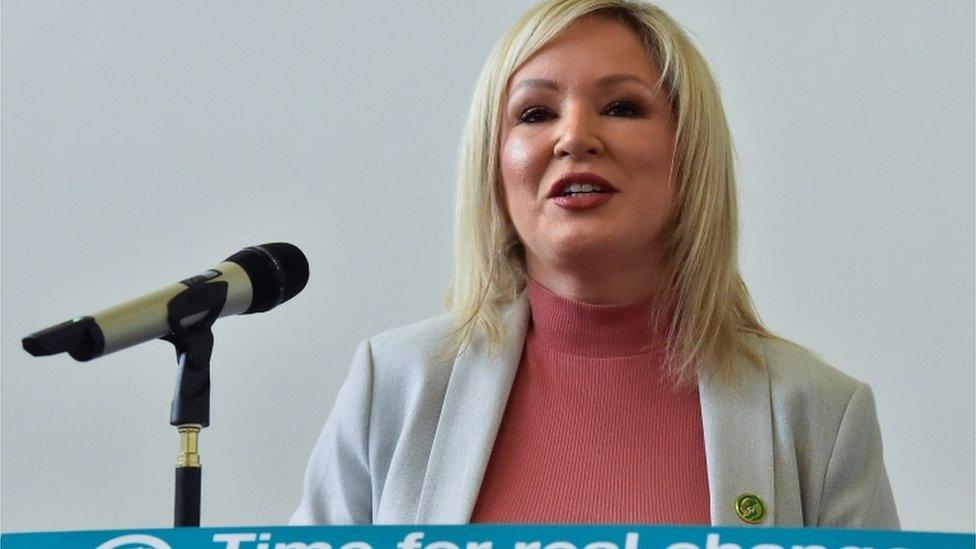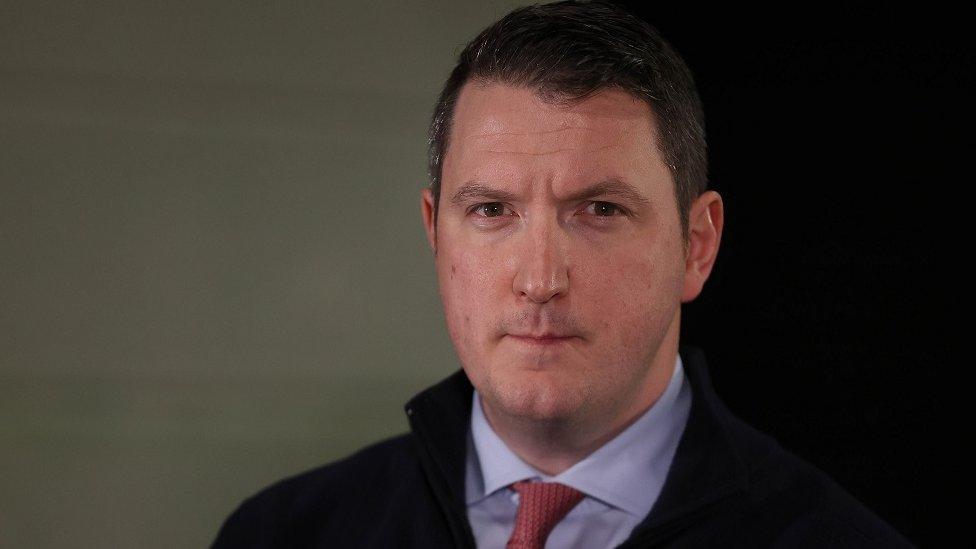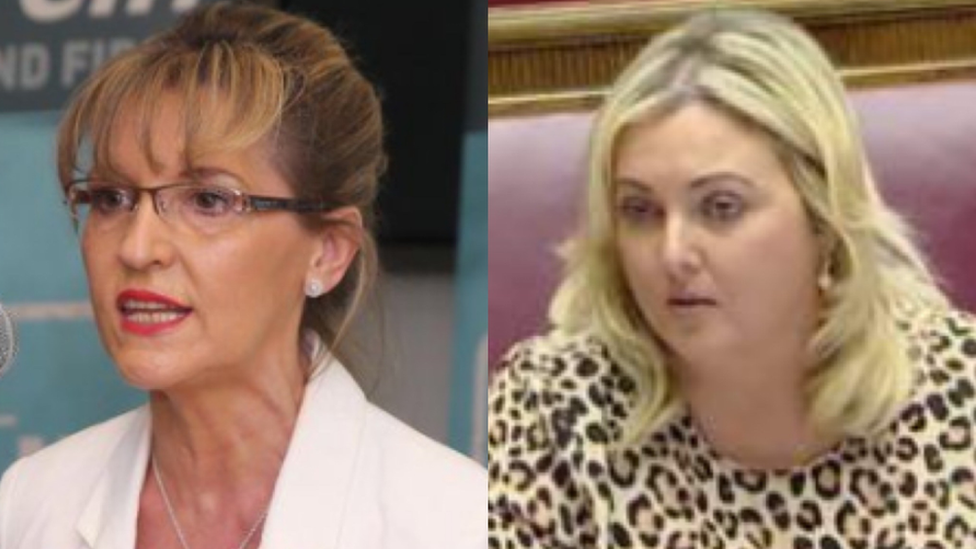NI election 2022: Sinn Féin steers clear of Irish unity focus in campaign
- Published

Sinn Féin leader Mary Lou McDonald is hoping her party will claim the most seats in the assembly election
Within minutes of taking up his assembly seat for the first time in 1998, Sinn Féin's Martin McGuinness pointed his finger at leader Ian Paisley and declared: "We've arrived."
He warned the Democratic Unionist Party leader "change was coming" and there was nothing the DUP could do about it.
Some 24 years on, if the polls are right, that change could come on 5 May.
Sinn Féin is predicted to replace the DUP as the largest party at Stormont and claim the office of first minister.
But if the hand of history was hovering above her shoulder, Sinn Féin's deputy leader Michelle O'Neill wasn't showing it last week as she boarded the Strangford Lough ferry on the campaign trail.
For the 10 minute crossing from Portaferry to Strangford, she steered her focus elsewhere.

Michelle O'Neill could be in line to become first minister
"There is no doubt it could be a significant election for historic purposes, but this election is about the future and I want to deliver on the things that matter right now," she said.
"The priorities for me after the election will be to deliver for the health service, education and dealing with the cost-of-living crisis and that is why I believe this election could be a game changer."

SIGN UP FOR ALERTS: Get extra updates on BBC Northern Ireland election coverage

But this election will not be about the biggest winner, but the smallest loser as both Sinn Féin and the DUP are expected to shed some seats.
Sinn Féin might be on the cusp of breaking new ground but it won't be because of a surge in votes, but rather a dip in the performance of its political rivals the DUP.
That has been reflected in Sinn Féin's campaign strategy.
Steering clear of controversy and providing no ammunition for the DUP to energise unionist voters has been a key focus.
Avoiding talk of taking the first minister role or prioritising a vote on Irish unification post-election are two traps Sinn Féin has tried hard to avoid.
Asked about the potential of a Sinn Féin first minister in Belfast and a Sinn Féin taoiseach (Irish prime minister) in Dublin driving the case for a united Ireland, Michelle O'Neill played it safe.
She insisted "there would only be constitutional change here when the people here decide" as laid out in the Good Friday Agreement.
But Sinn Féin knows it has a battle to repeat its election performance of 2017 when the party secured 27 seats in the 90-seat assembly, making it the second-biggest party behind the DUP, which won 28.
Claiming three of the five seats in four different constituencies together with four in Belfast West was a masterclass in vote management.
This time around transfers will be key if the party hopes to retain those seats.
The Finucane factor
That explains why Belfast North MP John Finucane fronted up the party's election broadcast with just a minor role for Ms O'Neill.
The single transferable vote (STV) system in Northern Ireland means voters rank parties in order of preference and their lower preferences can come into play once their top preference candidate is either elected or eliminated.
Sinn Féin hopes the Finucane factor, with his middle-class and cross-community credentials, might put them in the market for transfers which have previously been beyond the party's reach.
Mr Finucane is a solicitor who won the Westminster seat of Belfast North from the DUP in the 2019 UK general election. It was the first time a non-unionist candidate had ever won the seat in a general election.
His father Pat, who was also a solicitor, was murdered by loyalist paramilitary group the Ulster Defence Association (UDA) in 1989.

John Finucane fronted up the party's election broadcast
Commentator Chris Donnelly believes Sinn Féin's tactic is one which could work.
"It makes sense for Sinn Féin to make the campaign about the cost-of-living crisis because they want to appeal to middle-ground voters and to soft nationalists to give them transfers," he told BBC News NI.
"That is why their most middle-ground friendly politician has been front and centre in the campaign."
He added that while voters from the other main nationalist party, the SDLP, "don't transfer to Sinn Féin in great numbers, they might be incentivised" with the prospect of taking the first minister role from the DUP, and that "could make all the difference".
Foyle shake-up
But if Sinn Féin has a weakness, then it may be in Foyle where the party removed two high profile assembly members in Martina Anderson and Karen Mullan and replaced them with two political newcomers with no electoral track record.
It was part of a shake-up in the constituency, which includes the city of Londonderry, after a string of poor election results in which the party lost five councillors and an MP.

Martina Anderson and Karen Mullan were deselected by Sinn Féin in Foyle
Aoife Moore, a political correspondent with the Irish Examiner, is from Derry and first broke the story about the Sinn Féin shake up.
She said some within the party still felt hurt about what happened.
"There are a lot of hard feelings in Derry Sinn Féin and in particular at how Martina Anderson was treated," she said.
"People respected her for the life she gave to republican politics and people were really upset, and we saw that in the response from her family.
"But Sinn Féin don't do anything without planning and they knew this was going to happen but they decided to go ahead with it anyway."
She also pointed to the absence of some of Sinn Féin's key figures in Foyle from the local campaign as very telling.
But she added: "The party had to act and is now privately confident of retaining the two seats."
Sinn Féin is fielding a total of 34 candidates - most of them women - across the 18 constituencies.

POSTCODE SEARCH: Who is standing in my area?
POLICY GUIDE: Who should I vote for in the NI Assembly election?
NORTHERN IRELAND: Essential guide to the Northern Ireland election
NOTIFICATIONS: Sign up for Northern Ireland election alerts

Related topics
- Published12 April 2022

- Published4 May 2022

- Published14 April 2022
